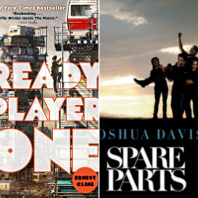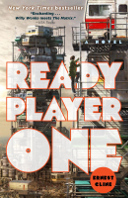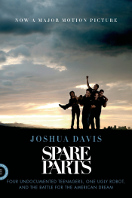 PULLMAN, Wash.—Washington State University has announced that two books are the 2017-18 common readings for thousands of students in first-year courses: Ready Player One, for Pullman, Tri-Cities, Spokane, Everett, and the Global Campus; and Spare Parts, for WSU Vancouver.
PULLMAN, Wash.—Washington State University has announced that two books are the 2017-18 common readings for thousands of students in first-year courses: Ready Player One, for Pullman, Tri-Cities, Spokane, Everett, and the Global Campus; and Spare Parts, for WSU Vancouver.
Both award-winning books were nominated soon after the call went out in September from the WSU-wide Common Reading Selection Committee. Its 14 members read and evaluated 34 books in total, all of which align with the program’s two-year theme of “frontiers of technology, health, and society.” Members recommended three finalists in February to WSU Provost and Executive Vice President Daniel J. Bernardo for the final selection.
WSU Vancouver Vice Chancellor Renny Christopher chose a different book from the nominations list, one that provides students there with a good transition from the campus’s 2016-17 book.
Thematic Ties Localize Readings
“Both selected books will allow our campuses to highlight cutting-edge innovations and applications of technology in a variety of fields, and to explore larger issues about the ethical dilemmas and changing sense of identity that arise in an increasingly digital world,” said Bernardo.
Christopher said, “Both books also highlight the importance of collaboration among diverse members of teams and the building of personal skill sets.”
Ready Player One, by Ernest Cline (2011)
 The action in this book takes characters between the real world and the technological cloud. In year 2044, environmental fallout from global warming has led to social woes and economic miseries, with people seeking escape from reality in MMORPGs—massively multi-player online role-playing games. Teenager Wade Watts has devoted his life to the virtual reality utopia named OASIS, a simulation game created by a man obsessed with 1980s pop culture and who has hidden puzzles in the game with the promise of unimaginable fortune and power to the one who deciphers them. When Watts finds a clue, will he be famous, or the target of have-nots?
The action in this book takes characters between the real world and the technological cloud. In year 2044, environmental fallout from global warming has led to social woes and economic miseries, with people seeking escape from reality in MMORPGs—massively multi-player online role-playing games. Teenager Wade Watts has devoted his life to the virtual reality utopia named OASIS, a simulation game created by a man obsessed with 1980s pop culture and who has hidden puzzles in the game with the promise of unimaginable fortune and power to the one who deciphers them. When Watts finds a clue, will he be famous, or the target of have-nots?
Why Ready Player One?
“Among the most compelling reasons for my selection (of Ready Player One) are that it has been used successfully (as a common book) at several peer institutions, it clearly appeals to a young audience, and most importantly, is it the first choice of the majority of the committee,” Bernardo wrote to Susan Poch, assistant vice provost and committee chair.
Poch said that one consideration for the committee is the availability of the author to visit campus in person as part of intense year-long programming around the selected book. More details will be forthcoming, but she confirmed that Ready Player One author, Ernest Cline, is scheduled to visit Pullman in August. A spoken-word artist, DeLorean car owner, classic video-game collector, and blogger, Cline also wrote the script for the 2009 cult film “Fanboys” and published a second book, ARMADA, in 2015.
Bernardo also noted one additional reason to select Ready Player One. “The book was published in 2011 and a movie release (based on the book) is scheduled for 2018. Using the book now makes it very timely.” His reference is to a film by the same name that has been in production in the U.S. and U.K. since July 2016 under the direction of Hollywood icon Steven Spielberg. The movie is set for a March 2018 release, which is mid-spring semester for WSU students using the book.
Spare Parts: Four Undocumented Teenagers, One Ugly Robot, and the Battle for the American Dream, by Joshua Davis (2014)
 The book, which was made into a movie directed by Sean McNamara in 2015, evolved from a “Wired” magazine article, “La Vida Robot,” which presents the true story of four Latino high-school students in Phoenix who formed a robotics club. “With no experience, $800, used car parts, and a dream,” said the IMDb website, the men, with help from inspiring science teachers, created an underwater robot built from such things as PVC pipes, deconstructed motor parts, and a waterproof briefcase. Called “Stinky” because of the glue that held it together, the robot competed in 2004 against high school and college teams at a national championship. One of those teams included MIT robotics champions backed by a grant from ExxonMobil. How did the Phoenix team fare? What futures awaited the Mexico-born, English-as-a-Second-Language, robotics team high-schoolers who held undocumented status?
The book, which was made into a movie directed by Sean McNamara in 2015, evolved from a “Wired” magazine article, “La Vida Robot,” which presents the true story of four Latino high-school students in Phoenix who formed a robotics club. “With no experience, $800, used car parts, and a dream,” said the IMDb website, the men, with help from inspiring science teachers, created an underwater robot built from such things as PVC pipes, deconstructed motor parts, and a waterproof briefcase. Called “Stinky” because of the glue that held it together, the robot competed in 2004 against high school and college teams at a national championship. One of those teams included MIT robotics champions backed by a grant from ExxonMobil. How did the Phoenix team fare? What futures awaited the Mexico-born, English-as-a-Second-Language, robotics team high-schoolers who held undocumented status?
Why Spare Parts?
“Spare Parts was chosen for Vancouver students because it addresses the theme of technology while also building on the topic of immigration, which we began to explore in 2016-17 through our common reading of the book Innovation Nation,” said Suzanne Smith, director of academic planning in the vice chancellor’s office and a selection committee member.
The book is author Joshua Davis’s third. He has been a contributing editor at “Wired” since 2003, and co-founded “Epic Magazine.” He has written for “The New Yorker,” “GQ,” and “Outside,” among other publications, and has been a TV host, documentary director, athletics competitor, and film producer.
Smith said that author Davis is lined up to visit the WSU Vancouver campus in October, although the date and details are not confirmed.
Common Reading as a System-wide Shared Initiative
“Representatives from every campus and many academic disciplines look forward in the coming year to continue the concept of common readings being a ‘system-wide shared initiative,’” said Karen Weathermon, Common Reading Program co-director. “While common reading programs across the WSU system have long had many touchpoints with each other in terms of books and programming, we worked together more purposefully starting in 2016-17 to have increased collaboration and cohesion at multiple campuses.”
Media Contacts:
Susan Poch, WSU Common Reading Program, 509-335-6037, poch@wsu.edu
Karen Weathermon, Common Reading Program co-director, WSU Undergraduate Education, 509-335-5488, kweathermon@wsu.edu
Suzanne Smith, WSU Vancouver Common Reading Program, 360-546-9714, smithsu@wsu.edu